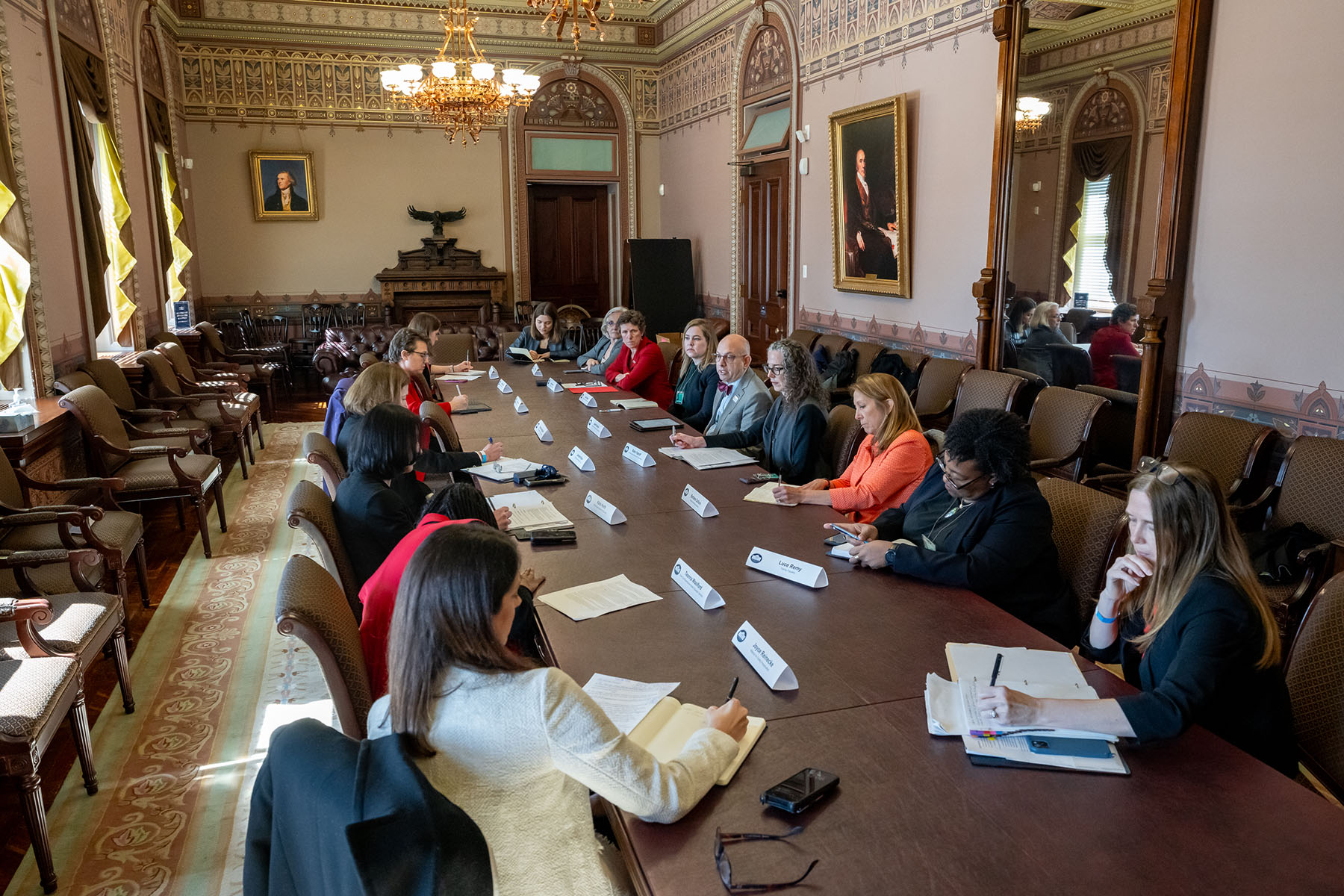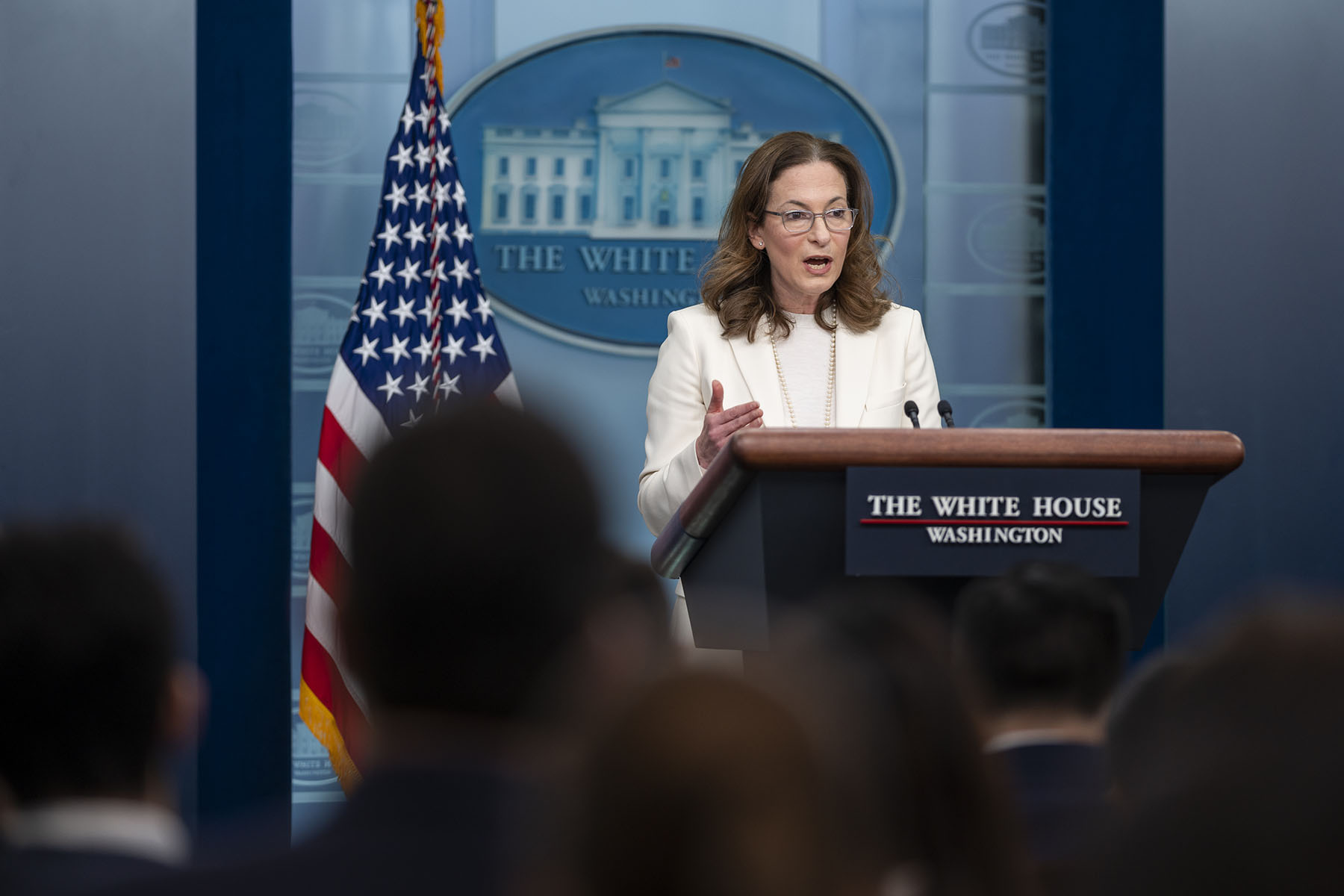When President Joe Biden took office, he quickly formed the White House Gender Policy Council. Part of its mission: to “protect, improve and expand access to health care, including sexual and reproductive health.”
But just over a year after the council’s formation, the Supreme Court made its mission all but impossible with its ruling in Dobbs v. Jackson Women’s Health Organization, which overturned Roe v. Wade and the constitutional right to abortion. For Klein, the ruling highlighted both the importance of the work and the limitations of executive power.
“I remember sitting with [Biden] in the Oval Office on the day the decision came down, and he was as angry as the rest of us. He was the first person who said to me, ‘You know, the only way to replace a right that was lost, a fundamental, constitutional right — which, by the way, the Supreme Court had never done before — is to pass federal legislation,’” said Jennifer Klein, who has served as director of the Gender Policy Council since its founding. “So that became the north star — but he knew, and we knew, that was going to be hard and probably impossible in this Congress.”
In an exit interview with The 19th conducted in the final month of the Biden administration, Klein reflected on the work of the first ever White House Gender Policy Council. Though there have been women’s offices and initiatives in past administrations, Republican and Democrat alike, the Gender Policy Council of the Biden-Harris administration was different, charged with thinking holistically about the way that the very concept of gender is baked into the United States’ policy agenda.
Its work was heavily shaped by the Supreme Court’s abortion decision. Preparations for that moment started long before it came in June 2022, kicked into gear by Texas’ six-week abortion ban that went into effect in September 2021, Klein said.
But after the Dobbs ruling, Klein said, the administration immediately began to do “whatever we could by executive action — and that’s why we ended up with three executive orders and a presidential memorandum.” These actions — advised upon by the council — focused on protecting access to medication abortion and emergency care, protecting patient privacy and physical security, and safeguarding reproductive health care for service members and veterans.
Today, Klein is still angry about the Supreme Court’s decision.
“I don’t even know what the right word is,” she said. “Upset doesn’t feel like a strong enough word. But when you look at what’s happened across the country — one in three women live in a state with an abortion ban. That’s more than 25 million women of reproductive age in this country,” Klein said. “Women are being turned away from emergency rooms in the middle of a miscarriage because the hospital doesn’t know whether under this extreme, restrictive abortion ban whether they can provide the care that you know that every health care provider knows she needs.”

On the one-year anniversary of the Dobbs ruling, Biden issued an executive order promoting access to over-the-counter contraception and expanding contraception access for active-duty military members, veterans, federal employees and college students. As part of the implementation of this order, the Gender Policy Council brought together pharmacists to talk about how they could promote contraception access.
Klein is particularly proud of the administration’s response to the Dobbs ruling, and the way they thought about addressing reproductive health holistically given the confines of executive power. “I do feel really proud and really confident that we did whatever we could by executive action and I think a lot of it will last. Not all of it. But a lot of it will last. The work was done very carefully. The work was done very thoughtfully.”
At the time, some Democrats pushed for the administration to do more to open up abortion access, suggesting performing abortions on federal lands or issuing travel vouchers. “We’re asking them to look in every toolbox to determine what they can do to make sure that people can get access to the care that they need,” Democratic Sen. Patty Murray of Washington said days after the ruling, part of the chorus calling for more.
-
Read Next:
But, Klein said, the administration didn’t think all the suggestions would have actually expanded abortion access. “We were really mindful of doing what was actually going to help — not just satisfy the cries for action. And I think we really did that,” she said.
The administration was also aware that their work could be undone by a successor. Now, with former President Donald Trump about to be sworn back into office, questions remain about what Trump — and a Republican-controlled Congress — may do.
“I think we did everything we could responsibly do by executive order on reproductive freedom, but I definitely feel like that is unfinished business. Restoring reproductive freedom in this country and around the world will remain something that I am focused on for the rest of my career,” Klein said, emotion in her voice.
Klein has served Democratic presidents for decades on the topics long-siloed as “women’s issues,” from reproductive rights to gender-based violence to child care and paid leave. She served as a deputy and senior adviser to Secretary of State Hillary Clinton’s Office of Global Women’s Issues during the Obama administration and, during the Clinton administration, worked as her senior domestic policy adviser and as a special assistant to President Bill Clinton on the Domestic Policy Council.
But the Gender Policy Council she led in the Biden-Harris administration was new, something she and a small team helped form starting in March 2021. The council worked on reproductive rights, as well as women’s health research, economic policy and more.
Klein pointed to the council’s work on gender-based violence as especially significant given that this work is “literally the cornerstone of President Biden’s career” from his days of writing the original 1994 Violence Against Women Act (VAWA) longform on a yellow legal pad. When VAWA was most recently reauthorized by Congress with bipartisan support in 2022, the council worked to expand safety and support measures for survivors while also increasing prevention efforts.
It pushed for the law to keep pace with technology. The 2022 reauthorization of VAWA created a federal civil cause of action for image-based sexual abuse, or what’s commonly referred to as “revenge porn,” because of the Gender Policy Council’s efforts.
-
Read Next:
The administration also launched a global partnership for action on gender-based violence — as of now, 14 countries have signed onto it — to tackle online harassment, specifically in the form of image-based abuse. Through work with international bodies including the United Nations, the Gender Policy Council has coordinated with private companies to better address image-based sexual abuse. The Department of Justice also funded the first ever national helpline for survivors of image-based abuse, run in cooperation with the Cyber Civil Rights Initiative, a nonprofit organization that works to combat image-based sexual abuse.
The Gender Policy Council’s work on gender-based violence also extended to the establishment of an independent review commission on military sexual assault through another Biden executive order. One of the most notable outcomes from this has been the transferring of decision-making from commanders to specialized, independent military prosecutors when active-duty military personnel are accused of sexual assault, domestic violence and other serious offenses.
Klein spoke passionately about what she hopes will be the legacy of the Gender Policy Council — and even more so about why the pursuit of gender equity matters. Gender equity isn’t simply good for women, she stressed, but good for America, good for the world. “If you look at the data, there is a well-established link between political stability and the treatment of women,” she said, making gender equity essential for national security.
Today, she hopes that people will understand that the council’s primary legacy is its very mission.
She connected her work on the Gender Policy Council to her time at the Office of Global Women’s Issues under Hillary Clinton. There, she recalled Clinton saying that she hoped the office wouldn’t be necessary in five years because everybody in the State Department would think of this work as their own.
“We did a lot to make sure that when we left the State Department it was embedded across every department and bureau. I feel the same way here — we still need a laser focus on women’s issues and gender equality, but we also need to continue to work to make sure … that people understand why this matters. We have to continue to do that,” Klein said.
Looking ahead, Klein said much of the criticism of equity and equality efforts is “really misguided,” failing to recognize the way it enables a stronger society.
“What I hope is that the next administration really does absorb the reality that this is work not at the margins. This work is not at the fringe. This work is central to ensuring equality and opportunity for everybody in the country and around the world,” she said. “It shouldn’t be seen as a zero sum game … — you know, this idea that if we’re helping women, it means we’re not helping them. If we invest in women’s economic opportunity, that somehow is leaving them behind. That’s really short-sighted, really misguided.”







